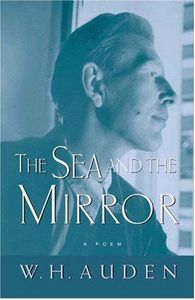The Sea and the Mirror: A Commentary on Shakespeare's The Tempest, is a long poem by W. H. Auden, written 1942-44, and first published in 1944. The poem is a series of dramatic monologues spoken by the characters in Shakespeare's play after the end of the play itself.
War Expereince
In 1937 he went to Spain intending to drive an ambulance for the Republic in the Spanish Civil War, but was put to work broadcasting propaganda, a job he left in order to visit the front. His seven-week visit to Spain affected him deeply, and his social views grew more complex as he found political realities to be more ambiguous and troubling than he had imagined.[9][23] Again attempting to combine reportage and art, he and Isherwood spent six months in 1938 visiting the Sino-Japanese War, working on their book Journey to a War (1939). Auden became an American citizen and was refused for active service, but in 1945 he spent a few months in Germany with US Air Force’s Strategic Bombing Survey studying the effects of aerial bombardment
Written in the midst of World War II after its author emigrated to America, The Sea and the Mirror is not merely a great poem but ranks as one of the most profound interpretations of Shakespeare's final play in the twentieth century. As W. H. Auden told friends, it is "really about the Christian conception of art" and it is "my Ars Poetica, in the same way I believe The Tempest to be Shakespeare's." This is the first critical edition. Arthur Kirsch's introduction and notes make the poem newly accessible to readers of Auden, readers of Shakespeare, and all those interested in the relation of life and literature--those two classic themes alluded to in its title.The poem begins in a theater after a performance of The Tempest has ended. It includes a moving speech in verse by Prospero bidding farewell to Ariel, a section in which the supporting characters speak in a dazzling variety of verse forms about their experiences on the island, and an extravagantly inventive section in prose that sees the uncivilized Caliban address the audience on art--an unalloyed example of what Auden's friend Oliver Sachs has called his "wild, extraordinary and demonic imagination."Besides annotating Auden's allusions and sources (in notes after the text), Kirsch provides extensive quotations from his manuscript drafts, permitting the reader to follow the poem's genesis in Auden's imagination. This book, which incorporates for the first time previously ignored corrections that Auden made on the galleys of the first edition, also provides an unusual opportunity to see the effect of one literary genius upon another.
